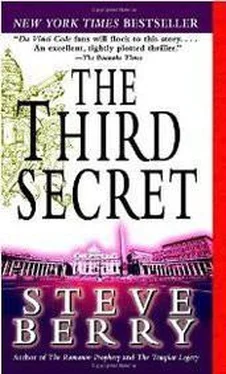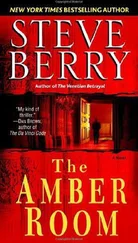“All I want to hear is my name read seventy-six times in the morning. If I have to wait, there will be consequences. My patience was tried today. I would not recommend a repeat. If my smiling face does not appear on the balcony of St. Peter’s by tomorrow afternoon, before you make it back to your rooms in the Domus Sanctae Marthae to retrieve your things, your reputations will be gone.”
He turned and left, not giving them the chance to utter a word.
FORTY-SIX
MEDJUGORJE, BOSNIA-HERZEGOVINA
Michener watched as the world spun in a blurry haze. His head pounded and his stomach flip-flopped. He tried to stand but couldn’t. Bile pooled in his throat and his vision winked in and out.
He was still outside, now only a gentle rain soaking his already saturated clothes. Thunder overhead confirmed that the nocturnal storm was still raging. He brought his watch close to his eyes, but multiple images swirled before him and he could not read the luminous dial. He massaged his forehead and felt a knot on the back of his head.
He wondered about Jasna and was just about to call her name when a bright light appeared in the sky. He thought at first it might be another bolt of lightning, like what surely had happened earlier, but this ball was smaller, more controlled. He thought it a helicopter, but no sound preceded the blue-white splotch as it drew closer.
The image floated before him, a few feet above the ground. His head and stomach still would not allow him to stand, so he lay back on the rocky earth and stared up.
The glow intensified.
Warmth radiated outward and comforted him. He raised an arm to shield his eyes and through slits between his fingers saw an image form.
A woman.
She wore a gray dress trimmed in light blue. A white veil draped her face and highlighted long locks of auburn hair. Her eyes were expressive, and the hues of her form fluctuated from white to blue to the palest yellow.
He recognized the face and dress. The statue he’d seen earlier in Jasna’s house. Our Lady of Fatima.
The intensity of the glow subsided, and though he still could not focus on anything else beyond a few inches, he could see the woman clearly.
“Stand, Father Michener,” she said in a mellow voice.
“I . . . tried . . . I can’t,” he stammered out.
“Stand.”
He pushed himself up to his feet. His head no longer swirled. His stomach was calm. He faced the light. “Who are you?”
“You do not know?”
“The Virgin Mary?”
“You speak the words as if they are a lie.”
“I don’t mean them to be.”
“Your defiance is strong. I see why you were chosen.”
“Chosen for what?”
“I told the children long ago that I would leave a sign for all who do not believe.”
“So Jasna now knows the tenth secret?” He was angry with himself for even asking the question. Bad enough he was hallucinating, now he was conversing with his own imagination.
“She is a blessed woman. She has done as heaven asked. Other men, who claim to be pious, cannot make that claim.”
“Clement XV?”
“Yes, Colin. I am one of those.”
The voice had deepened and the image metamorphosized into Jakob Volkner. He stood in full papal regalia—amice, cincture, stole, miter, and pallium—just as he’d appeared at his burial, a shepherd’s staff held in his right hand. The sight startled him. What was happening here?
“Jakob?”
“Do not ignore heaven any longer. Do as I asked. Remember, there is much to be said for a loyal servant.”
Exactly what Jasna had told him earlier. But why wouldn’t his own hallucination include information he already knew? “What is my destiny, Jakob?”
The vision became Father Tibor. The priest appeared exactly as when they’d first met at the orphanage. “To be a sign to the world. A beacon for repentance. The messenger to announce that God is very much alive.”
Before he could say anything, the Virgin’s image returned.
“Do as your heart commands. There is nothing wrong in that. But do not forsake your faith, for in the end it will be all that remains.”
The vision started to rise, becoming a brilliant ball of light that dissolved into the night above. The farther away it receded, the more his head ached. As the light finally vanished, the world around him started to spin and his stomach erupted.
FORTY-SEVEN
VATICAN CITY, 7:00 A.M.
Breakfast was a somber affair in the dining room of the Domus Sanctae Marthae. Nearly half of the cardinals were enjoying eggs, ham, fruit, and bread in silence. Many opted only for coffee or juice, but Valendrea filled a plate from the buffet line. He wanted to show the assembled men that he was unaffected by what had happened yesterday, his legendary appetite still in place.
He sat with a group of cardinals at a window table. They were a diverse lot, from Australia, Venezuela, Slovakia, Lebanon, and Mexico. Two were strong supporters, but the other three, he believed, were among the eleven who’d yet to choose a side. His gaze caught Ngovi entering the dining room. The African was intent in a lively conversation with two cardinals. Perhaps he, too, was trying to project not the slightest hint of concern.
“Alberto,” one of the cardinals at the table was saying.
He glanced over at the Australian.
“Keep the faith today. I prayed all evening and feel something will occur this morning.”
He maintained a stoic look. “God’s will is what drives us forward. My only hope is that the Holy Spirit is with us today.”
“You are the logical choice,” the Lebanese cardinal said, his voice louder than necessary.
“Yes, he is,” a cardinal at another table said.
He looked up from his eggs and saw it was the Spaniard from last night. The stout little man was out of his chair.
“This Church has languished,” the Spaniard said. “It’s time something be done. I can recall when the pope commanded respect. When governments all the way to Moscow cared what Rome did. Now we are nothing. Our priests are forbidden from political involvement. Our bishops are discouraged from taking a stand. Complacent popes are destroying us.”
Another cardinal stood. He was a bearded man from Cameroon. Valendrea hardly knew him and assumed he was Ngovi’s. “I didn’t consider Clement XV complacent. He was loved throughout the world and did much in his short time.”
The Spaniard held up his hands. “I don’t mean disrespect. This is not personal. It’s about what is best for the Church. Luckily, we have a man among us who carries respect in the world. Cardinal Valendrea would be an exemplary pontiff. Why settle for less?”
Valendrea let his gaze settle on Ngovi. If the camerlengo was offended by the remark, he showed nothing.
This was one of those moments that pundits would later describe. How the Holy Spirit swept down and moved the conclave. Though the Apostolic Constitution banned campaigning prior to convening, there was no such prohibition once locked inside the Sistine. In fact, frank discussion was the entire purpose of the secret gathering. He was impressed with the Spaniard’s tactic. He’d not thought the fool capable of such grandstanding.
“I don’t consider Cardinal Ngovi a settlement for less,” the Cameroon cardinal finally said. “He’s a man of God. A man of this Church. Above reproach. He would be an excellent pontiff.”
“And Valendrea would not?” the French cardinal blurted out, coming to his feet.
Valendrea marveled at the sight, princes of the Church, adorned in robes, openly debating one another. Any other time they would go out of their way to avoid confrontation.
“Valendrea is young. He is what this Church needs. Ceremony and rhetoric do not make a leader. It’s the character of the man that leads the faithful. He’s proven his character. He’s served many popes—”
Читать дальше












